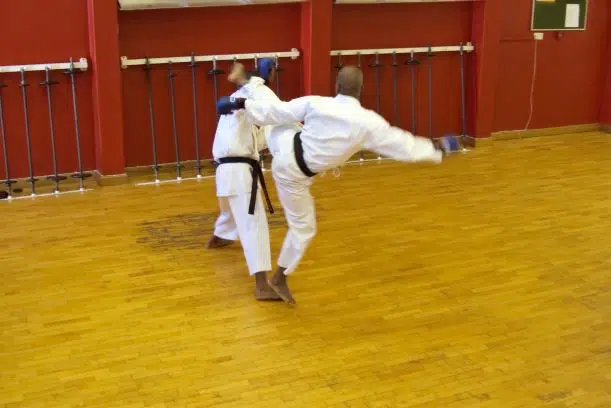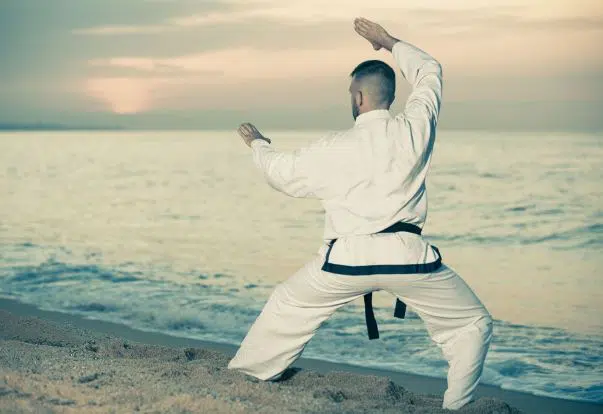I started karate at an early age, and because I was so young I didn’t give much thought to how difficult it was to learn.
Now that I’m older and have had some time to think about it, and trying other martial arts, I thought I’d write this article to explain whether karate is easy to learn or not.
So, is karate easy to learn? The curriculum itself isn’t difficult, and karate is easy to learn. But, it does require you to develop a good level of flexibility and fitness which can take a bit of time. And getting really good at the different techniques, and developing timing takes many hours of practice.
Now, that should give you a good overview. But I thought I’d narrow down the 9 top reasons why karate is easy to learn to give you a good idea of how it compares to other martial arts.

1. The techniques aren’t very complicated
Some martial arts incorporate impractical moves and incorporate obscure weapons that add to the number of techniques you need to learn.
Karate by contrast has around 10 strikes that are easy body movements that you can begin doing almost right away. And then you combine them into kata which helps you be creative in how you apply the moves.
Compared to Jiu jitsu, judo, and wrestling involves complex weight distribution, and complicated grips that can be very overwhelming to a beginner.
2. Schools are easy to find
Karate is very popular due to movies like the Karate Kid, which means that it’s easy to find a school. And in most cities, there are lots of different schools to choose from.
By comparison, some martial arts aren’t as widespread, so you have to travel a long way to go to class. Or, you might have to move to another town altogether to train them.
You might also have to factor in the extra time it takes to travel to the academy, and you may have to leave home, work, or school at funny times so you miss the peak hour traffic.
This makes it more difficult and time-consuming and this can demotivate you to train, which means you’ll train less and it can take longer to get good. Also, it can sometimes be logistically impossible to train. Making some other martial arts harder to learn.
Related to this is the next reason.
3. It’s popular
Because karate is popular you will have lots of people that are excited and willing to train it with you. This makes it easy to find training partners, and you don’t have to convince other people to train with you or work around their schedule.
This means more time to train, and the more you train the faster you’ll get good.
Because karate has been so widespread for so long, there are also a lot of very qualified instructors – black belts who have a tonne of experience.
Other martial arts like Brazilian jiu jitsu have only been popular since about the 1990s and black belts aren’t as abundant – except in certain cities. As a result, the level of instruction may not be as good, because they don’t have as much experience teaching.
4. You make good friends which motivates you to train
This occurs in other martial arts but is a big factor that makes karate easy to learn. As you may be aware, when you’re motivated to learn something you spend more time on it and get better faster.
As part of training karate, you develop a special bond with the people you train with, and you naturally motivate each other to keep training.
Since I’ve been training martial arts for a while I sometimes think I can just skip a class because I’m already pretty good.
But, when I think about hanging out and having a good time with my training partners and friends I get motivated to train and get better. And as a result, go to more classes than I normally would.

5. There are a tonne of resources online
Although this isn’t unique to karate, because the internet is so widespread and has been around for a long time, many instructors have put up videos online that show the techniques for free on websites like Youtube. You can also buy online courses.
This makes it easy to review a technique at home before class and to learn the entire curriculum really fast, and overall makes it easy to learn karate.
6. You can practice the techniques in competitions
Some martial arts like kung fu, and ninjitsu don’t have regular competitions where you can practice what you’ve learned against someone who is trying to avoid it. And avoid them trying to use their moves on you.
This makes it more difficult to develop your timing, and reflexes for the different techniques. Which is very important in being able to perform them in a real-life situation to defend yourself.
Pretty much everyone takes up martial arts to defend themselves, and without the reflexes and timing, you won’t be prepared to use what you learn effectively in a self-defense situation.
This part of a martial art is easy to learn specifically in karate. But, martial arts like kickboxing, boxing, and judo ALSO, typically include live sparring to develop your skills, and have a lot of tournaments and competitions.
Here’s a cool video showing how karate competition looks from the World Karate Federation:
7. You don’t get injured as much as other martial arts
Some martial arts are notorious for producing injuries, like wrestling, and jiu jitsu. Where people regularly strain a wrist, neck, or elbow because the movements involve putting your body into a position where your training partner has their whole body weight or can twist at a funny angle and strain something.
In an article by The Sport Journal, they showed that jiu jitsu aikido and kung fu have around twice the injuries as karate, judo, and tae kwon do based on a bunch of scientific studies.
I have trained wrestling, jiu jitsu, and kickboxing. And in my experience wrestling and jiu jitsu are much more injury-prone than kickboxing. And kickboxing and karate are very similar.
With karate, the sparring is usually done really lightly and involves staying standing. So, you avoid all the injuries that occur from grappling.
As a result, you can train more often, because you don’t have to stay home from class because of an injury or watch the class from the sidelines.
It’s important to note here that it does depend on the individual karate school you go to. And certain schools have a bully vibe where you will get injured regularly. I explained more about this here karate at 40, and how to find a good school.
8. It gives you more confidence
Training karate develops more skills to protect yourself from an aggressor, and this gives you a REAL sense of confidence.
You move your body differently when just walking around, and talk differently to people you know and strangers alike. People subconsciously pick up on that and as a result, people get a sense that they can’t push you around.
This makes your life easier, and you feel confident to achieve anything you want in life. You get this same feeling training other martial arts. But, developing this feeling further really motivates you to train, and starts a positive cycle where you train more regularly and learn faster and easier.
9. You feel really good after training
Similar to giving you more confidence, and developing good friends, karate involves physical activity that makes you feel really good after you train and for the next few days.
When you haven’t trained karate for a while you lose the good feeling and want to get it back, so you end up going to more classes and practicing more regularly.
This isn’t unique to karate, and you can get these same benefits from doing a strength workout, or going for a run. However, it’s an added benefit that gives you more motivation to train regularly and makes it easy to learn.
In Conclusion
To summarise everything in a few words, the reasons karate is easy to learn are that:
- Schools are easy to find
- It’s popular
- The techniques aren’t complicated
- There are a tonne of resources online
- You can practice the techniques in competitions
- You don’t get injured as much as other martial arts
- You make good friends which motivates you train more
- It gives you more confidence
- You feel really good after training
